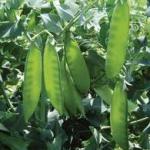Peas
Peas are legumes (see Fertilizer below) and are a cool season crop that may be planted as early in the spring as the soil becomes tillable. Pea seed will germinate well at soil temperatures as low as 50°F, but germination is slow. Extended periods of cool, wet weather during the germination period may cause rotting of the seed. For this reason, fertile, well-drained, sandy soils should be selected for early plantings. Finer-textured soils with high moisture-holding capacities are preferred for late spring crops. The use of treated seed is helpful in overcoming the problem of seed decay.
Several root rot organisms that attack peas usually begin at the tips of the feeder roots and progress towards the main roots, or occasionally show on the stem slightly above ground level. Rotation can reduce problems with root rot in peas.
Peas that mature during hot, dry weather frequently show reduced yield and quality. If hot, dry conditions normally occur in your area, pea planting should be suspended in mid-May and resume in July for fall harvest. If hot, dry summer weather occurs for only short periods in your area, plantings can be made throughout the summer using heat resistant varieties for mid-summer harvest.
Three types of peas are in demand:
- English or Garden Pea—only the seed is eaten.
- Edible Podded or Snow Pea—only the pod is desirable.
- Sugar Pea or Sugar Snap—both pod and seed are eaten
For Current information on production methods (including varieties, spacing, seeding, and fertility), weed, disease, and insect management, please visit the New England Vegetable Management Guide website
Major insect pests that affect this crop:
The Center for Agriculture, Food and the Environment and UMass Extension are equal opportunity providers and employers, United States Department of Agriculture cooperating. Contact your local Extension office for information on disability accommodations. Contact the State Center Director’s Office if you have concerns related to discrimination, 413-545-4800 or see ag.umass.edu/civil-rights-information.
